#Kohlberg's Stages of Moral Development
Text


TTRPGs teach Moral Values.
If we look at Kohlberg's Stages of Moral Development, we find players practising and learning these behaviors, values and principles at each stage.
#Kohlberg's Stages of Moral Development#Moral Values#Universal Principles#Avoiding Punishment#Consequences#Learning#Behaviors#Behaviours#Principles#Values#TTRPG#Tabletop#RPGs#Roleplaying Games#Moral Dilemmas
0 notes
Text
new fanfic pet peeve is when people are writing children and clearly don’t know the difference between a 3-year-old, a 7-year-old, and a 13-year-old. this newborn isn’t saying words, this teenager is learning emotional intelligence, this child is literally not capable of comprehending that complex topic. please, it takes 2 minutes to look up “how should a 9-year-old be speaking” and “how developed is a 4-year-old’s mind”
you could even take it a half step further and look up the various stages of development in people. piaget, kohlberg, erikson, all those psychologists created these stages because we all followed such strict patterns when growing. you don’t need to go into the moral development of your oc’s child but at least make sure they’re speaking and acting like a child would at that age.
also when in doubt, for older children just go for more mature. it’s far better than treating teenagers like they don’t know what an emotion is lol
#writing this because the fic i just read followed a LOT of 13-year-olds#and yet none of them were at ALL emotionally mature#like they were at the maturity i would’ve expected from a 9- or 10-year-old at best#just complete lake of control or awareness and no recognition of development#if your fic follows a large period of time we should be seeing GROWTH#it’s not enough to just acknowledge the birthdays passing#i’d like to see more complex thoughts and actions and awareness of consequences#i want to see your characters starting to feel regret and compassion more#weighing pros and cons and dealing with possibilities#they aren’t just existing anymore. they are actively participating in the world#but nooooo have your bloody 16-year-old be blubbering and unable to parse out a simple emotional interaction#yeah yeah context and whatever but seriously it’s just embarrassing#we already put so much effort into our fics so WHY should we give up here??
133 notes
·
View notes
Text
THAT DAMNED SPREADSHEET
DOES ANYONE TO HEAR ABOUT MY ADVENTURE IN THE SPREADSHEET?
Cause I'm pretty damned sure I know what getting "High" on Milgram means.
Talking about his being rejected by the Magnus Institute, Samama said:
[That definitely feels like when it all started. […] Well, after that it all just went downhill. Didn’t get into Oxford, so I went to Nottingham.]
And that does not sound like what one would say about something that happened when they were, like, eight. So I went to take another look at the spreadsheet. Of course I was wrong, because The Magnus Institute burned in 1999, so he couldn’t have been more than nine, but I found out other stuff.
A thing that bugs me in how I’ve read some discussing the spreadsheet is that Sam has the highest empathy score, and that it made him “too nice/good” for the Institute’s purposes (not necessarily this directly but it has been implied, including in the “recruiting future avatar theories, and… well, implying that low empathy makes you more likely to become a literal monster is quite disgusting, actually).
First, I think we got one thing wrong on the Kohlberg column. Since they are kids, it doesn’t seem shocking that they’d be around stages 1 to 3 of his “Six stages of moral development”; but it doesn’t say Stage 1, 2 or 3 it says Level 1, 2 or 3, and I don’t think it’s a mistake.
His six stages are divided into three levels: Pre-Conventional (1,2), Conventional (3,4) and Post-Conventional (5,6).
People in stages 1 and 2 (Level 1) have a sense of morality that is linked to the direct consequences of their actions on themself — stage 1 is “don’t hit the dog because you’ll be punished” and stage 2 “give her half your banana and you’ll get half her chocolate bar” (very simplified).
People on stages 3 and 4 (Level 2) have internalized their surrounding’s sense of morality and act accordingly — stage 3 being “I’ll get a good grade in being a person by following the rules” and stage 4 “the rules I learnt are true and real, failing to follow them is Wrong and upholding them is Right” (idem).
People on stages 5 and 6 (Level 3) have a personal sense of morality that is critical of societal norms — stage 5 being “there are rules, and those rules can and should be changed through compromise to be fair to the greatest number”, and stage 6 “unfair rules should not be followed, direct consequences like punishment are irrelevant when it comes to deciding to do what it right” (very, very, very simplified).
If I’m right, the spreadsheet is so much more understandable.
First thing I wanted to do was put numbers on how singular Sam’s results are:
He gets “High” on both Milgram and Asch when the overwhelming tendency is that the higher your other scores are, the more likely you are to get “Low”, and the numbers were, indeed, that among the 49 children who scored “High” on both, 33 were in Piaget’s stage 1, 15 were in stage 2 and only Sam was in stage 3.
The 33 kids who were in stage 1 are the opposite of Sam:
(Abbreviating so it’s easier to compare values but P=Piaget, K=Kohlberg, Ps=Prosocial, S-A=Sally-Anne, U=Ultimatum, EI=Empathy Index)
33K: (P) Stage 1 :: (K) Level 1 :: (Ps) Low :: (S-A) Fail :: (U) Unfair :: (EI) ≥62%
Sam: (P) Stage 3 :: (K) Level 3 :: (Ps) High :: (S-A) Pass :: (U) Fair :: (EI) 98%
So that’s weird. And when I went to filter by Kohlberg levels… absolutely no kid that was on “Level 2” scored High on Milgram and Asche.
In fact, among the 99 kids on Kohlberg Level 2, none got “Low” for prosocial, none got “High” on Milgram, only 2 got “High” on Asch.
And when we read “Level 2 (Conventional Morality) instead of “Stage 2 (Pre-Conventional Morality, what benefits me directly)” we can make sense of this:
“To reason in a conventional way is to judge the morality of actions by comparing them to society's views and expectations. […] Conventional morality is characterized by an acceptance of society's conventions concerning right and wrong. At this level an individual obeys rules and follows society's norms even when there are no consequences for obedience or disobedience. Adherence to rules and conventions is somewhat rigid, however, and a rule's appropriateness or fairness is seldom questioned.” (by Kohlberg himself, from Wikipedia)
Adults can be Level 2, by the way. Adults can even be Level 1. Subjects of the Milgram experiment are displaying peak Level 2 behavior.
“High” on Milgram is “Did not electrocute/Disobeyed”
“High” on Asch is “Did not conform”
GOSH THAT IS SATISFYING
Bonus: the average empathy index is 79,1%, the median is 82% with 116 kids below 82%, 13 kids at 82% and 120 kids above. Of the 116 kids below the median, 11 got “Low” on Milgram. Of the 13 median kids, 3 got “Low” on Milgram. Of the 120 kids above, 91 got “Low”.
If we take the average instead, of the 163 kids more empathetic than the average, 100 got “Low” on Milgram, and 2 got “High”, of the 86 less empathetic than the average, 5 got “Low” and 59 for “High” on Milgram.
So actually here, low empathy is inversely correlated to willingness to hurt if ordered to.
And it makes sense. Low empathy is often associated with anti-social personality disorder, autism, depression — and you know what’s very associated with anti-social personality disorder? Disobedience.
Now I have to make another post about the weird kids in red's names.
#tmagp#tmagp theory#tmagp arg#samama khalid#tmagp spoilers#the magnus protocol#the magnus institute#the spreadsheet#guys i am so unused to numbers now#it's three am and i haven't eaten since breakfast#i don't even know if someone made a post like this already but i didn't find anything
55 notes
·
View notes
Text

So we know this spreadsheet, right? These are the test results from the study the Magnus Institute ran on that group of kids, including our best guy Sam.
First of all: As Sam is we’re getting more and more MagInst. mentions as the series progresses, i thought it would be neat to dissect it a little. I’m fairly sure that it has been done before, but I haven’t really seen it. Because of that, if anyone has a good post or any additional info I’m missing here, I’d love to see it!
Now, on with
the spreadsheet
I’m not sure if we’ve confirmed what exactly the Institute is looking for with these tests. My current theory is that they might’ve been looking for a host/catalyst/avatar of sorts which they could guide from a young age, though I’m not sure if that holds up.
On top of that, I’m not sure what green opposed to red or yellow opposed to white means in the spreadsheet. I am however assuming that the majority of the kids were eventually rejected.
I think that the kids marked in red are kids who already got or are going to be rejected: Griffin(?), Opal, Winnie and Yasmine. It’s incomplete, though, as we know that Sam got terminated from the program at some point during it’s run.
I also think that the kids marked in white are probably of particular interest to the Institute: Joshua, Zoe, Olivia and Sophia. I’ll be comparing their scores to Sam’s scores, since we know for a fact he got rejected at some point, showing us that his results weren’t favorable for the Institute.
So while we can’t know for certain what the institute wanted to do with these results, we can make an estimation on what qualities they were looking for.
First of, name and date of birth. This isn’t really relevant for us, except maybe that the maximum age difference is about 5 years.
Next: Piaget. Jean Piaget was a psychologist who studied children’s cognitive development. The stages in the spreadsheet are from a theory of Piaget’s that described intellectual development (in particular, the way which they obtain and process information). There are 4 stages in total, but the spreadsheet only contains stage 2 and 3.
Stage 2, The Preoperational Stage: Can use/understand symbolism, struggles to see from another’s perspective, and thinks very concretely (based on one’s own experiences (what they hear, feel, see. Example: something flat is bigger than something round, though in reality the volumes are the same and the flat shape only looks bigger) and the present as opposed to the past of future).
Stage 3, The Concrete Operational Stage: Begins to use/understand logic and conservation (the amount of water in a wide cup is the same amount in a tall, narrow cup), begins to think of how others might think and feel and understand that what the child thinks might be different from what others think.
The most notable on this section is that Joshua is the only kid shown to be at stage 2. Sam and all the other children are at stage 3, likely meaning that Joshua struggles most with understanding that other people can think differently from him and finds it difficult to apply logic.
Kohlberg. Lawrence Kohlberg's stages of moral development are an adaptation of Piaget’s theory centered on moral development in children. There are six stages in total, divided into 3 levels. The spreadsheet shows levels 2 and 3.
Level 2: Action’s morality is judged by social norms and societal expectations. Social rules are generally followed even if there is no reward or threat of punishment. However, the nature of the rules themselves aren’t questioned and often blindly followed. (Includes stage 3 (being aware of other’s judgement and wants to please them in order to be liked/perceived as good) and stage 4 (wants to follow the rules/demand of authority. They don’t really feel the need to please any individual and are instead devoted to a duty to follow laws. When someone breaks a law, they did wrong)
Level 3: Morality is judged on an individual level. Societal norms are recognized as shifting instead of constant. Authorities and rules are questioned. Rules can be broken when out of line with their personal values. (Includes stage 5 (Laws shouldn’t always dictate behavior and the greater good is prioritized) and stage 6 (justice is prioritized. There is an obligation to break unjust laws. Actions are taking because they are fundamentally good, not for self interest or because of an obligation to laws).
Notable here is that Olivia is the only child at stage 2. Likely meaning she has a rigid concept of what is good and what should be done according to a pre-established set of rules and might have trouble recognizing when those rules might not apply or be harmful.
Prosocial. Prosocial behavior is identified by an intent to benefit others, either on an individual level or for the group. This behavior can occur out of empathy or self-interest. It can include a willingness to share and cooperate with, comfort, or help others. It often falls in line with social norms.
Joshua is shown as the only one with a moderate score in this category, which could be indicative that he is less likely to specifically act to benefit someone or a group. This might fall in line with his lower Piaget score. If he doesn’t realize others might not always benefit from what benefits him, he’s less likely to act on it.
Sally-Anne. The Sally-Anne test tests theory of mind. It can show that someone recognizes that others have their own thoughts and beliefs that might not align with reality.
Zoe, Olivia and Sophia all fail the test, showing they might not have a complete understanding of what others might think, feel or believe. Interestingly, Joshua passes the test, despite his lower Piaget score suggesting he might fail. Maybe this is suggesting that he does understand logic and know what others might think, but has less motivation to act in other’s benefit.
Ultimatum. Everyone is listed as ‘fair’, so this category doesn’t tell us much.
Empathy index.
Joshua, Zoe, Olivia, and Sophia all have average empathy scores among most of the other children. Sam has the highest empathy score out of all the children, meaning he probably excels at putting himself in other’s shoes, understanding how others might feel and how they perceive a situation.
Milgram. The Milgram experiments were a series of experiments conducted by Stanley Milgram. They tested the willingness of participants to fallow the orders of authority, even if those orders misaligned with the participant’s own moral code.
Joshua and Zoe scored moderately on the test, showing they were more willing to carry out tasks given to them by an authority figure that went against their own moral beliefs than the children who scored low such as Olivia and Sophia, who likely weren’t influenced by the authority in the experiment and stuck to their own moral. Sam is the only one shown to have scored high on the experiment, probably meaning he is extremely obedient to authority figures and has a high disregard for his own morals when authority needs him to be, despite his high empathy.
Asch. The Asch conformity experiments were a series of experiments conducted by Solomon Asch. They tested an individual’s willingness to conform to the group (of peers), despite their own beliefs.
Joshua and Zoe have low scores, showing that they’re unlikely to go against their own beliefs in order to not stand out in a group. Olivia and Sophia are shown to have moderate scores, they might conform to the group under specific circumstances. Sam, once again, is the only one with a high score, meaning he is most likely to want to blend in with a group and is willing to suppress his own beliefs to do so.
One thing I don’t really understand is the ‘s’ marked in Winnie’s Asch score. Does it mean Standard? Does it show she hasn’t done the test? Is it a typo? No clue!
In conclusion
Considering all that information, I think it’s fair to say that the Institute is looking for children who are easy to manipulate.
Joshua’s level 2 Piaget score behaviour can make it difficult for him to realize other’s might have bad intentions and his moderate Milgram score can mean he’s more willing to fallow the instructions of authorities. Along with that, his moderate Prosocial score might indicate he’s more likely to act in ways that are detrimental to others. Even though he passed the Sally-Anne test, this might make him vulnerable to manipulation.
Zoe also had a moderate Milgram score, showing she’s more susceptible to the requests of authority figures. Zoe, Olivia and Sophia also failed the Sally-Anne test, which might mean they struggle with understanding the intentions of others and how their actions impact the people around them. That can mean they can be influenced to act in ways they don’t fully comprehend the consequences of.
Olivia has a level 2 Kohlberg score, which probably means she has a very rigid view on rules and feels an obligation to follow them. She and Sophia also have a moderate Asch score, making them more susceptible to peer pressure.
But then why was Sam rejected? He had the highest Milgram and Asch test results, which can indicate he can be very vulnerable to manipulation!
I believe it this to do with his high empathy score. Considering that and the fact he also passes the Sally-Anne test, he might have been too likely to figure out what the Institute’s intentions with them were and would’ve likely informed others, which the Institute couldn’t have.
That, or something about his high empathy score would’ve somehow prevented him from becoming a proper catalyst, he might care too much for the people he’d harm and that would somehow prevent something to fully manifest.
But really, I have no idea! If anyone has some thoughts about this, I’d love to hear them!
#that darn Institute and it’s gifted students#the magnus protocol spoilers#the magnus protocol#tmagp#tmagp spoilers#sam khalid#samama khalid
49 notes
·
View notes
Text
in the great tradition of making up an argument in my head and writing about and publishing it a la the great philosophers of old except also this does come from posts I've seen around too lmao, I am back here today with a very correct opinion on Yan Wushi and Shen Qiao.
So. a couple of types of opinions I've seen in old meta posts give this impression that people are treating the "Yan Wushi believes humans are inherently evil"/"Shen Qiao believes humans are inherently good" as, like... fixed worldview/viewpoints that these respective characters have.
I simply do not think this is so. And I think it not only does a huge disservice to the characters and MengXiShi's writing, but imo it also affects the way you interpret the characters if you think that they respectively hold such fixed rules about the world as their viewpoint.
Like just on a general level, to ascribe so black-and-white, simplified, fixed worldview to these characters doesn't sit right with me because these kinds of rigid worldviews are very immature type of worldviews. To reference to Kohlberg's stages of moral development, to have such fixed "good"/"bad" views is a very conventional-stage way of thinking, and textual interpretations aside I think it'd be very foolish to have such a rigid, unnuanced worldview.
But beyond that, I just don't think the interpretation that either of them holds such rigid unnuanced worldview uncritically bears out in the text.
The biggest/easiest chunk of text to reference here is Chap 46, where SQ flashes back on something his Master Qi Fengge taught him:
“Because ‘tip of sword pointing upward’ is just a vague description. There’s no established rule defining whether one should point it up by an inch or two. Ah-qiao, rigidly adhering to the rules will only limit your own thoughts and visions, and this is true for learning martial arts as well as for conducting yourself.”
“There are many people in this world —— some of them are good, and some of them are bad. But there are even more who can’t be simply classified as ‘good’ or ‘bad’. They may not think in the same way you think, or walk the same path you walk. Just like the case with Yu Ai and Yuan Ying —— even the same set of sword arts looks slightly different in different people’s hands. Don’t deny others just because they are different from you. Like how the ocean is capable of holding water from thousands of rivers, a person should be forgiving and tolerant to diversity, and it is the same for practicing martial arts. People who are narrow-minded can only achieve so much. Even if they do reach the summit, they cannot stay there for long.”
(QQ ch46, snowycodex tl, emphasis added)
I like this chapter since I think this helps sum up a lot of transferable concepts that imo we see bear out in SQ's conduct and worldview.
So I think, rather than saying "he believes that humans are inherently good," a more accurate way to describe it is "he believes in the inherent goodness (the possibility of inherent goodness) in all people." Which isn't to say that there aren't "bad" people in the world - he killed Huo Xijing for example, and doesn't express any regret about it. But that he believes in the ability of people to do good/be good, even if that doesn't bear out all of the time. It's a very optimistic sort of view on the potential of humanity.
Yan Wushi on the other hand, yes he has declared "you're too naive SQ, humans are evil by nature," etc but this happens by way of him making certain points to SQ, not as part of a philosophical discourse where we might see the full nuances of each's philosophy argued out, so I think to see it as a fixed "rule" he has for the world is shortsighted (and also ascribes a shortsightedness to him that I just don't think he has. He sees SQ as a curiosity sure but not like an aberration against a fixed worldview. He's amused when SQ chooses kindness, not perplexed).
So I think a more useful interpretation of YWS's worldview is more along the lines of, like, averages. In that instead of seeing YWS as "he believes all people are Evil by nature," it's more like, statistically speaking he believes that humans can/will be led astray by a variety of factors, and that even the most "good" person can have "evil" actions teased out of them if they are pushed enough - the exact experiment he is running with SQ. To me, this idea that like, in his experience humans are more statistically likely to act out of selfish/self-preserving/"evil" intentions than altruistic ones in the longterm, works a lot better for interpreting his character and making him a good foil for SQ. He's the pessimism on "human nature" to SQ's optimism - the "even if you have a close relationship, if you get in the way of self-preservation then people can be pushed to the point of valuing the self over you."
But yeah, the tl;dr of it all is, I don't think Yan Wushi and Shen Qiao are the "humans are inherently evil/good" characters, it's more, Shen Qiao is the "humans are capable of doing good/being kind and I choose to believe in that," and Yan Wushi is the "if you push someone enough they will abandon altruism, everyone has a bottom line including you" (though I think he underestimates how much hope SQ can find in the little kindnesses in the world lol, cuz like in Chap46 we see him close to some sort of abyss of despair but is QUICKLY brought back up by encountering Shiwu. But I think per the rule of statistical averages, SQ is very much a Kindness Georg so that's why I don't think he rocks YWS's worldview - he still has a place in the bell curve he's just way far out on the narrow end lmao).
But anyway, this complexity is what makes them (1) interesting characters, and (2) good foils for each other. Thanks for coming to my TED talk lmao
25 notes
·
View notes
Text
Fun prompts and models for writing believable trauma and psychological change
wanted to share some resources I use all the time bc I hope they will be helpful to anyone who gets stuck with character growth, but mostly because I love to nerd out and gatekeeping knowledge is not very hot girl summer
1. The 4F Model of Trauma Response
The human nervous system has four basic reactions to threats: Fight, Flight, Freeze, and Fawn. A healthy nervous system is able to access all four based on the situation, move adaptively between them as needed, and return to a calm state when the danger has passed. People who experience trauma or who grow up in dangerous/neglectful environments can get stuck in a maladaptive pattern of one or two responses. People can also get stuck in chronic stress response which causes lots of physical and psychological problems.
Example: Jo's father yells at them when he is in a bad mood. Jo learns that they can avoid being yelled at by figuring out what makes their father mad, anticipating his moods, and catering to his preferences (Fawn). In adulthood, Jo often emotionally caretakes for their romantic partners, and finds themselves in relationships with people who take advantage of this.
For writing: Decide which response(s) a character gravitates toward to determine how they'd react in certain situations. Demonstrate change by having them learn and practice a new reaction, build awareness of their own pattern, demonstrate cause and effect, etc. How does the stuck response show up in big and small ways? Under what circumstances would they react differently?
2. Erik Erikson's Stages of Psychosocial Development
Children develop in stages that each feature two opposing psychological tendencies: Trust v. Mistrust, Autonomy v. Shame, Initiative v. Guilt, etc. People can become stalled in a phase or stuck in maladaptive patterns because of a trauma or unmet needs. The effects on relationships and functioning in the present reflect which stage is unresolved or during which stage the damage occurred.
Example: Becky's mom solves all of her problems instead of appropriately encouraging her to try. Becky misses opportunities to watch herself succeed and internalizes the belief that her mom thinks she can't do anything for herself. She grows up into an adult with patterns of passivity in relationships, difficulties with motivation, and low self-esteem.
For writing: A character's main arc could be about resolving one of these stages, or struggling with its effects in their life. It can also inform how they react to closeness with others and obstacles that arise. What did a past trauma teach them about how the world works? What events would challenge their beliefs? What would motivate them enough to change, and what circumstances would allow that to happen?
3. Lawrence Kohlberg's Moral Development Theory
People develop morally just as they do physically and psychologically. Kohlberg outlines six stages of moral development beginning with Punishment/Obedience (morality is determined by consequences) and ending with Universal Ethical Principles (a personally developed set of ethics that applies to all situations, regardless of law). People experience moral development when their current stage does not address the nuance of a situation they encounter.
Example: Martin thinks gay people are immoral because the Bible says so. Martin's sibling comes out as gay, and he knows his sibling is not evil. Martin re-evaluates his belief system and acknowledges limitations of the Bible as a moral primer.
In writing: Ethical dilemmas ethical dilemmas ethical dilemmas. Characters develop by challenging long-held belief systems. This can be VERY painful and destabilizing! What circumstances would cause them to change their mind? How do they react to someone at a different level? Do others understand their principles? How do they react when their beliefs are challenged?
4. Three Stages of Trauma Recovery
Trauma recovery typically occurs in three progressive stages: Safety and Stabilization, Remembering and Grieving, and Reconnection and Integration. People establish baseline stability, explore effects of trauma and emotionally grieve loss and change, and integrate insight and meaning into a new sense of self.
Example: Alex was a victim of a home invasion and afterward feels unsafe at home, compulsively checks locks, has panic attacks when alone, and starts drinking to cope with their emotions. Wanting to feel better, Alex moves to a new apartment, gets a dog, and takes up knitting instead of drinking. Alex opens up to trusted people and begins feeling bursts of sadness and anger, realizing the break-in destroyed their belief that people are mostly good. Alex gets involved in advocacy for trauma survivors and uses their experience to practice compassion toward themselves and others.
In writing: The aftereffects of trauma involve new (often negative) beliefs about oneself, others, and the world at large. How would a specific trauma change their beliefs? What meaning would a character make about what happened to them? How would it affect their relationships? What stage would a character struggle most with? What emotions would need to be felt in order to move forward? How would it change the trajectory of their life?
14 notes
·
View notes
Text
@friendshapedhole: “what is kohlberg stage 3?”
Kohlberg was Some Guy who came up with an idea of stages of moral development.
NOT stages of morality - you can be at a higher stage of moral development and also be a worse person.
Stages of how you think about morality.
So at KS1 you basically cannot think about morality at all
KS2 Thinks in reward/punishment
KS3 is the stage where you can tell the difference between “popular action” and “unpopular action.”
KS3 is where you get the kind of people who think we should defund the police, and also think firearms should be banned, we should send somebody around to pick them all up.
Because it is popular (in their social circle) to say “ACAB” and it is popular (in their social circle) to stand against firearms, and it is not popular to think for five seconds and realize the people you want to send out to gather guns are police officers.
The policies they propose are not based on morality or consequences, they are based on “It is popular to suggest these policies, and unpopular to stand against them.”
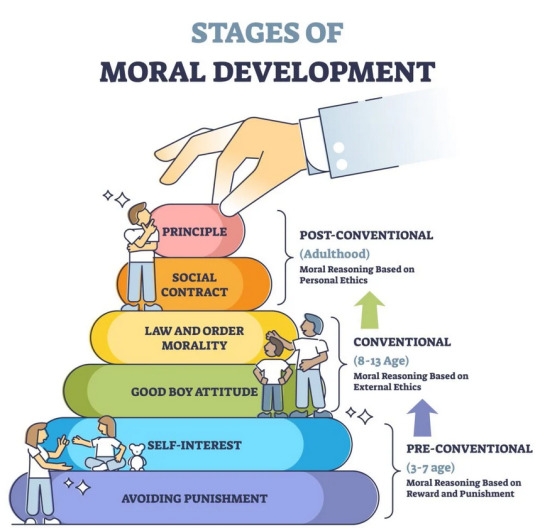
As the image illustrates, with its tiers, Kohlberg believed his research showed that KS3 was a moral stage you grew out of as you left childhood and became a teenager, but it turns out actually KS3 is something like 90% posters and 100% of bad takes online.
People might secretly be higher, of course, but they talk like they’re KS3.
44 notes
·
View notes
Text
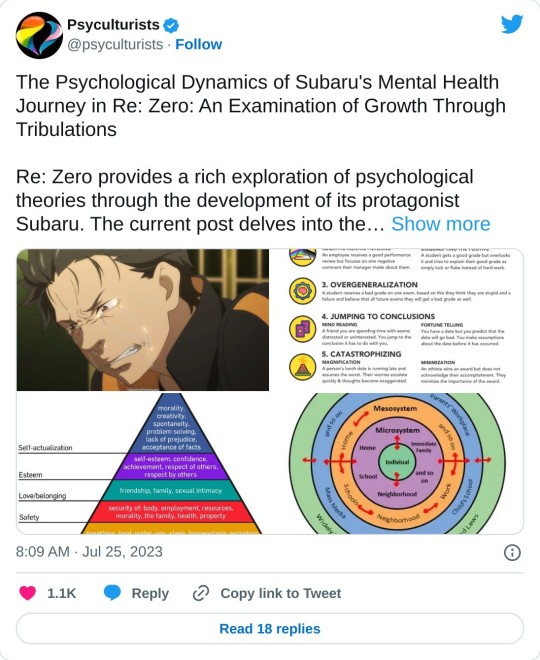
The Psychological Dynamics of Subaru's Mental Health Journey in Re: Zero: An Examination of Growth Through Tribulations
Re: Zero provides a rich exploration of psychological theories through the development of its protagonist Subaru. The current post delves into the psychological evolution of Subaru, focusing on Maslow's hierarchy of needs, Bowlby's attachment theory, Kohlberg's stages of moral development, defense mechanisms, Bronfenbrenner's ecological theory, cognitive distortions, and the concept of relapse in personal growth. This is all from Season 1 and Season 2, as I am an anime only. I will state that as the new season airs and more information comes to light, information is subject to change. This is not about diagnosing a character but rather understanding aspects of their mental health journey through a psychological perspective.
Maslow's Hierarchy of Needs and Subaru's Development Maslow's hierarchy of needs theory is a staple in the study of human motivation, proposing that humans are motivated to fulfill basic needs before moving on to more complex ones (Maslow, 1943). The hierarchy is usually depicted as a five-level pyramid, with physiological needs at the bottom, followed by safety, love and belonging, esteem, and self-actualization at the top. In Re: Zero, Subaru's journey through this hierarchy is not linear, with his position within the pyramid fluctuating based on circumstances and experiences. The physiological level, which includes food, water, warmth, and rest, is initially a priority for Subaru. Upon arriving in the alternate world, he grapples with these basic needs, with characters like Emilia and Rem assisting him. However, even after these needs are met, life-threatening events can throw him back to this level, showcasing a fluctuation within the pyramid. Safety needs become important as Subaru faces numerous perils in the new world. His need for personal security and safety is continuously threatened, particularly against violent deaths. Subaru often meets these needs using his unique ability to return by death, creating a safe outcome for himself and those around him. Love and belongingness needs are manifested in Subaru's interactions with Emilia, Rem, and Beako. The companionship and acceptance Subaru experiences through these relationships fulfill his need for love and belonging. However, situations such as Emilia's initial rejection of his overbearing protection can cause him to perceive a loss of this belonging, pushing him down the pyramid. Subaru's pursuit of esteem needs is evident in his constant drive for acknowledgment and respect, particularly from Emilia and Rem. However, frequent failures, rejections, and misunderstandings lead to fluctuations in this area. His dynamic relationship with Beako mainly tests his self-esteem. Self-actualization, the highest level, refers to the need to fulfill one's potential and is seen in Subaru's journey toward becoming a hero in the alternate world. This need is continuous and remains a constant objective for Subaru. However, as evident throughout the series, Subaru's progression to this stage is consistently challenged by the fluctuating state of his lower-level needs.
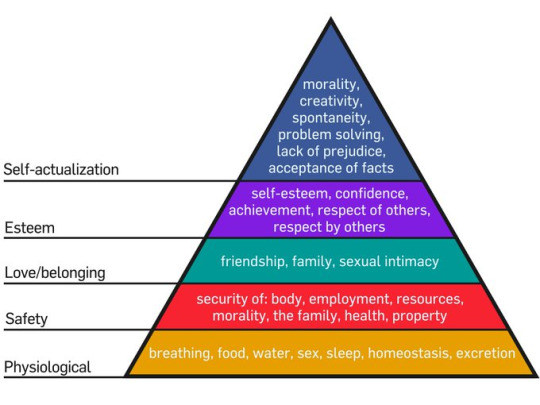
Bowlby's Attachment Theory, Defense Mechanisms, and Toxic Attachments Bowlby's attachment theory suggests that an individual's early relationships and attachments significantly influence their emotional development and interactions in later relationships (Bowlby, 1969). Subaru's relationships with Emilia, Rem, and Beako reflect various attachment styles, underpinning his emotional growth and development. With Emilia, Subaru tries to form a secure attachment, evident in his constant desire to be in her presence and the comfort he draws from their interactions. He trusts her and often seeks emotional refuge in her, indicative of the secure base in such attachments. However, Subaru's actual relationship with Emilia for most of the series so far presents a slightly different attachment style. While he exhibits affection for Emilia, his constant need to affirm his feelings suggests an anxious-preoccupied attachment. Here, Subaru's reliance on Emilia and others for emotional validation often leads to insecurity and anxiety. In a manner, Subaru seeks validation and approval from Emilia, like his yearning for his father's recognition. Subaru's relationship with Beako demonstrates a disorganized attachment style. This form of attachment is characterized by patterns of behavior that lack a coherent strategy for managing stress and fear (Bretherton, 1992). Subaru seems to fluctuate between seeking some form of comfort from Beako and being wary of her unpredictable responses, resulting in a complex and often turbulent dynamic.
Defense Mechanisms in Subaru's Psychological Development Let us talk a little about Subaru's coping strategies in the face of the series' numerous challenges, often aligning with classic defense mechanisms outlined in psychoanalytic theory. For example, he frequently uses denial, especially in the initial stages of the series. Unable to cope with the harsh reality of his situation, Subaru often ignores or denies some of the evident problems he encounters. As his journey progresses, he begins to employ more adaptive defense mechanisms. For instance, he uses humor to diffuse tense situations, a mechanism often associated with mature psychological coping. He also demonstrates sublimation, channeling his negative emotions into productive activities, like devising survival strategies or working towards resolving conflicts.
Toxic Attachments in Subaru's Relationships Although attachment forms the foundation of social bonds, it can also lead to toxic relationships when mismanaged. In Subaru's case, his strong attachments occasionally push him into toxic behavior. His attachment to Emilia, for instance, initially leads him to be overprotective and controlling, disregarding her autonomy. This behavior is typical of toxic attachment, where one person excessively depends on another for emotional support or validation. However, it is essential to note that Subaru learns from these negative experiences. He gradually understands the importance of respecting individual autonomy and independence, moving away from toxic behavior patterns as he grows. This transformation further underscores the importance of cognitive growth and self-awareness in establishing and maintaining healthy relationships.
Kohlberg's Theory of Moral Development and Subaru's Moral Maturation Subaru's moral growth can be explored using Kohlberg's theory of development (Kohlberg, 1981). This theory encompasses three stages; pre-conventional, conventional, and post-conventional, all of which can be observed in Subaru's relationships with Emilia, Rem, and Beako. Regarding Emilia, Subaru initially operates at the conventional stage by relying on deceit to navigate the unfamiliar world. However, as he matures, he begins to prioritize norms reflecting the conventional stage. As his connections with others deepen over time, Subaru's moral reasoning advances to the post-conventional stage. His selfless actions in protecting Emilia and Rem despite their objections demonstrate a standpoint and signify Subaru's’ progress from self-centeredness to becoming an empathetic and ethical individual (Gilligan, 1982).
Bronfenbrenner's Ecological Theory and Subaru's Growth Bronfenbrenner's Ecological Systems Theory suggests that an individual's development is influenced by systems of relationships that form their environment, ranging from immediate settings to broader social and cultural contexts (Bronfenbrenner, 1979). In Re: Zero, Subaru's growth, and development can be understood within the framework of these interacting systems. At the microsystem level, Subaru's immediate relationships with Emilia, Rem, and Beako shape his behaviors, emotions, and attitudes. Each relationship introduces unique challenges and rewards, significantly influencing his perception of himself and his environment. For instance, Subaru's growing emotional intelligence and resilience can be linked to his experiences within these microsystems. The mesosystem, which involves interactions between different elements of an individual's microsystem, also plays a crucial role in Subaru's growth. For example, the dynamics between Subaru, Emilia, and Rem introduce Subaru to the complexity of social interactions and the importance of understanding and managing interrelation conflicts. The exosystem, which includes environments not directly experienced but still influential, is represented by the broader political and social structures of the alternate world. Subaru's struggles and efforts to navigate these complex systems—such as the royal selection process and the conflicts between different factions—further drive his psychological and emotional growth. The outermost layer involving broader cultural values and customs, the macrosystem heavily influences Subaru's adaptation to the new world. The values and social norms of the alternate world, distinct from his own, compel Subaru to reassess his behaviors, attitudes, and beliefs, fostering personal growth. Lastly, the chronosystem, encompassing changes over time, is fundamental to understanding Subaru's development. His unique ability to "return by death," which involves temporal changes, provides him with multiple opportunities to learn from his mistakes and adapt his behaviors accordingly.
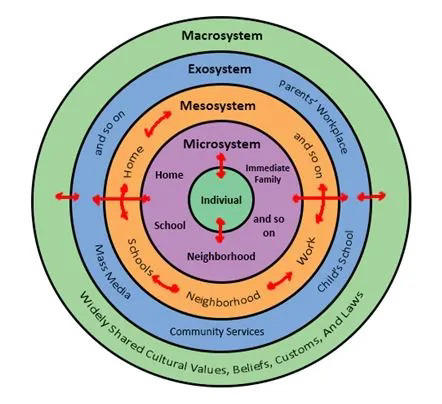
Cognitive Distortions and Subaru's Psychological Evolution Subaru frequently experiences cognitive distortions, irrational thought patterns that tend to reinforce negative thoughts or emotions (Burns, 1989). The most prominent among them is catastrophic thinking, where Subaru perceives a situation as far worse than it is. This distortion is particularly apparent during his early days in the alternate world, where every challenge or setback is viewed as insurmountable, triggering extreme responses, such as desperate pleas for help or self-sacrificial actions. These cognitive distortions come to light in his relationship with his companions. For instance, when Emilia rejects Subaru's overbearing protection, he catastrophically perceives it as the end of their relationship. His interactions with Beako and Rem further amplify this cognitive distortion, where he sees every disagreement or conflict as a personal failure or an indication of their waning trust in him. However, through consistent exposure to his cognitive distortions and their subsequent consequences, Subaru gradually learns to address them. He learns that disagreements or conflicts are not always catastrophic and can be resolved through communication and mutual understanding. His repeated failures (relapses) and successes in navigating the new world's challenges reinforce this understanding.

Relapses and Personal Growth Subaru's' journey toward growth and understanding involves experiencing relapses as elements. According to the Transtheoretical Model of behavior change, setbacks or relapses are not indicators of failure but integral parts of the change process (Prochaska et al., 1992). This model recognizes that individuals attempting to change their behaviors do not follow a path. Rather a cyclical one encompassing stages like pre-contemplation, contemplation, preparation, action, maintenance, and even relapse. In Re: Zero, this cycle is evident through Subaru's’ ability to reset back to a point every time he dies. Each reset represents a relapse triggered by distortions or unsuccessful attempts at overcoming challenges. However, with each reset comes lessons for Subaru as he learns from his mistakes, reevaluates his approach, and develops strategies for survival and problem-solving. These repeated relapses and subsequent cycles of learning and growth significantly contribute to Subaru's development, emotional maturity, and moral evolution.
Conclusion The character growth and development of Subaru in Re: Zero explores many psychological theories within the complexities of his journey. From the perspective of Maslow's hierarchy of needs, Bowlby's attachment theory, and Kohlberg's moral development stages, this series gives us an insight into psychology. Subaru's use of defense mechanisms, interactions within Bronfenbrenner's ecological systems, ability to overcome distortions, and understanding that setbacks are part of personal growth all contribute to his development and maturity. Emilia, Rem, Beako, and all other characters play big roles in this journey as catalysts and companions for Subaru. They offer support while presenting challenges that help him grow, highlighting the significance of relationships in development.
41 notes
·
View notes
Text
Developmental Psychology in The Outsiders: An Analysis (WARNING: SPOILERS)
I read The Outsiders over the weekend because I was bored. I was hooked into the story so quickly that it was probably the fastest I've finished a book in the last few years. Absolute 10/10 highly recommend if you haven't read it.
I had to write an analysis based off of a book I've read for my psych final project, so I decided to analyse the characteristics of the characters. This is based on terminology used from the Developmental Psychology unit of my class, so to clarify: I am NOT an expert in any of this. I wrote this for academic purposes/fun and thought to post my analysis here because I thought it could be a place for my brainrot. Enjoy!
This goes into detail about how Ponyboy, Dally, Darry, Sodapop, and Johnny fit into Erikson's Stages of Development, Kohlberg's Theory of Moral Development, and Piaget's Theory of Cognitive Development. I DO NOT elaborate on the theories themselves in this piece, so if you'd like to learn more, I recommend doing research on your own if you'd like to further connect.
FULL DISCLOSURE WARNING BEFORE I PROCEED:
THIS CONTAINS SPOILERS FOR THE NOVEL THE OUTSIDERS. DO NOT READ FURTHER IF YOU DO NOT WISH TO SPOIL YOURSELF. THIS IS MY FINAL WARNING.
Now to proceed to the analysis. Please enjoy.
------------------------------------------------------------------------------
Developmental Psychology in The Outsiders
The Outsiders tells the story of two rival gangs in Tulsa, Oklahoma in the 1960s. The Socs (Socials) are a group of reckless, rich, well-dressed teenagers that participate in drinking, fighting, and jumping the rival gang. The Greasers, working-class teens known for long greased back hair, fighting, drinking, recklessness, and sometimes organized crime. The story follows Ponyboy Curtis, a smart fourteen year old greaser who’s lifestyle and family are directly involved in the greaser scene. His older brothers, Darry and Sodapop, work jobs to support the family after their parents die. Darry, the oldest, works two jobs to keep the family afloat. Sodapop drops out of school to work at a gas station to support them. They encourage Ponyboy to stay in school to “get out” and go to college, wishing the best for him. Johnny, one of the more sensible and anti-violence members, gets jumped and beaten up one night. He’s known as the scared one of the group, and the other members try to protect him and make him feel comfortable. He doesn’t have a very good home life, and primarily finds his idea of family in his friend group. Another character, Dallas, is the most reckless of the group. He goes around picking fights and drinking, in and out of jail. He’s protective and loyal though. One night Ponyboy and Darry get into a fight. He goes by to hang out with Johnny to seek comfort. While Johnny and Ponyboy are hanging out at a park, a group of Socs jump them and attempt to drown Ponyboy. In a sudden panic, Johnny uses a switchblade to stab one of them, causing him to bleed out. The two flee, running to Dally (Dallas) for help. He instructs them to hide out in another town for a few days. They travel to the hideout, guilt racking up in their brains. Dally comes by a few days later to check in on them, and they go out for a little bit. However, when they come back, they find the hideout on fire. Children are caught up in the fire, and the three rush in to rescue the kids. Johnny and Dally are both badly hurt. The group is rushed to the hospital. Ponyboy gets out alright and reunites with his brothers. Johnny and Dally stay in the hospital for a few days, trying to recover. Johnny is severely injured and will not be able to walk properly the rest of his life. Meanwhile, the murder causes a rupture in the town’s gang relations. The greasers prepare for a rumble with the Socs, and Ponyboy is caught between wanting to join and stay safe. At the end, he ends up participating, with Dally coming in at the last minute to help, despite still being slightly injured. The greasers win the fight, and Dally and Ponyboy rush back to the hospital to see Johnny once more. He tells Ponyboy to “Stay gold” before passing away. Dally is distraught, running off. Before Ponyboy can stop him, he starts causing chaos by robbing stores and making threats. The police shoot him down. Darry and Sodapop hear about this, coming to Ponyboy’s comfort as the events unfold. In the end, Ponyboy shows up to a course hearing concerning the murder. The Socs members who jumped him agree to testify that it was in self defense. Ponyboy is acquitted and returns to school. His grades drop however, and in an attempt to save his English grade, he tells the story of all that has happened for a final assignment grade.
The story primarily focuses on how the lifestyles of people in socially different gangs are more similar than what people think. The story attempts to relate to adolescents, but portrays them in a way that’s relatable on a personal level. While the events that unfold in the story are more intense than what a normal teenager would go through, the exploration of identity and moral choice by the main character gives the reader a chance to question their own identity roles and choices. It depicts the changing identity roles of those in adolescence, and challenges the morals they might consider when hanging out with a certain group of people. This challenging of social order allows for the reader to see past the black and white outlines of the two groups, seeing that throughout the novel that despite vast social customs, that everyone is still human at the end of the day.
Erikson’s Stages of Development
Ponyboy - Identity vs. Role Confusion - At the beginning of the story, Ponyboy starts off in identity diffusion. He is good at schoolwork and a talented runner on his track team. He hangs out with his greaser friends and family, casually adopting their lifestyle. However, he has not chosen one over the other. When Johnny commits the murder though, he is forced to choose. He decides to run away with Johnny, showing a commitment to the rough greaser lifestyle, against his will. This is his beginning of Identity Foreclosure, as he is forced to commit to this identity under the pressure of getting caught or in trouble. When he reunites with his brothers though and decides to participate in the rumble despite being given an out, he willingly commits to joining with the greaser lifestyle. He chooses to fully adopt the identity and support his brothers and friends in their fight. This is his change to identity achievement.
Darry - Intimacy vs. Isolation - Darry is a young adult who has finished school and dreams about going to college. However, after an accident that kills his parents, he is forced to take jobs to support the family. Ponyboy says he doesn’t believe Darry should be living the greaser lifestyle - he’s too mature and clever to be fooling around. He is forced to take on the role of caregiver to his two brothers though. The relationship between Darry and Ponyboy is directly explored in the story. Darry is strict with Ponyboy if he stays out late, gets into the slightest mischief, or doesn’t finish his homework. Darry doesn’t hold Sodapop to the same standards. This upsets Ponyboy. Darry is in isolation, as his attempts to connect with Sodapop and Ponyboy are kept to a minimum. He is strict with Ponyboy because he is trying to take on the parental figure role while also struggling to recognize what he wants for himself. His relationship with Soda isn’t close either. He struggles to form a good relationship with Ponyboy. But after he comes back from his escape, the two reconcile after their fight. Darry realizes that he is strict on Ponyboy because he wants the best for him, but doesn’t know how to give him space or be accommodating. The two find common ground and strengthen their relationship.
Sodapop - Intimacy vs. Isolation - At the beginning of the story when Ponyboy characterizes the members of his group, he mentions that Soda desires to elope with a girl he loves and start over. The two of them are around sixteen-seventeen years old, and Darry would disapprove. He was hoping to subtly live a life with her. After the fire and murder incidents though, Soda reveals that his girlfriend has left for Florida and not returned any of his letters. He feels isolated, as the one he loved has left him. He also has to deal with the fighting between Ponyboy and Darry, and doesn’t know how to deal with it. He is caught in the middle, and doesn’t know what to do.
Dally - Intimacy vs. Isolation - Unlike other characters that will be talked about/have been talked about, Dally has pretty good relationships going on for him. He is a rough person by nature and has his fair share of problems, but his loyalty and willingness to help others demonstrates his strength in intimacy. When Johnny and Ponyboy are desperate for escape help, Dally risks his safety to tell them where to hide out and provides advice. He even comes up to visit and check on them, demonstrating the trust that he has between the two of them. His caring and fiercely loyal nature shine through his solid and steady relationships with his fellow greasers.
Johnny - Identity vs. Role Confusion - At the beginning of the story, Johnny is known to be a non-violent member of the greasers who cares about his friends and doesn’t wish to fight and get hurt. He’s a core part of the greasers, being a sort of solid ground that everyone in the group wishes to protect and care for. He casually adopts the identity of a greaser. During one scene at the beginning of the story though, he and Ponyboy are seen hanging out with a group of Socs girls at the movie theater. The girls comment how Ponyboy and Johnny are nice boys and not like the other greasers. Here, Johnny and Ponyboy are forced to question why they hang around the greasers. Johnny and Ponyboy question their natures and personalities. But when Ponyboy is in danger, Johnny stabs a Soc to protect Ponyboy, fully assuming the characteristics of a Greaser.
Kohlberg’s Theory of Moral Development
Ponyboy - Conventional morality - When Johnny commits the murder, Ponyboy follows along by fleeing because of the peer pressure of the moment. However, he later recalls when hiding out that he contemplated turning himself and Johnny in because he was scared. He desires to abide by laws of the government, despite not doing this action himself. He feels guilty for running away, and realizes that he wants to comply with the law. When Dally, Ponyboy, and Johnny briefly leave the hideout to get food, they come back to discover that it is on fire and children are still inside. During this outing, Ponyboy decided to go back to town and turn himself in. When the fire gets worse, Ponyboy chooses to rush in when his friends do, and doesn’t care about getting in trouble with the police. While this is a slight sign of postconventional morality, Ponyboy is primarily driven by the law though.
Darry - Conventional morality - When Dally comes to check on Johnny and Ponyboy in hiding, Dally brings a letter written by Darry. He asks if they are okay, but urges Ponyboy and Johnny to come home and turn themselves in. He is concerned for the safety of his brother and friend, but he wants them to obey the law and stay out of more trouble if they can. His insistence that Johnny and Ponyboy do the right thing in accordance with the law demonstrates an alignment with conventional morality.
Sodapop - Conventional morality - While Sodapop’s morality isn’t very focused on in the story, it is shown in the letter that he agrees with Darry’s urgence that they come home and turn themselves in properly. He is a little more casual about following the law than Darry is, but he still believes that in the end, Johnny and Ponyboy should be honest with the law and come home.
Dally - Postconventional morality - Dally doesn’t care about getting in trouble with the law or not. He picks fights, steals, and carries weapons to threaten people. He decides to risk getting in trouble when he tells Johnny and Ponyboy about the hideout, even more so risking himself when he comes by to check up on them. In postconventional morality, few people tend to prioritize their own reasons over the law. Dally shows this explicitly when he jumps in to assist Johnny and Ponyboy when they’re hiding. When Johnny dies, he decides to go berserk and rob stores and threaten people because he is upset by Johnny’s death. He doesn’t care that he’s going to get in trouble carrying a weapon that people would find threatening. He decides to be reckless because it makes him feel something, and doesn’t care about the repercussions.
Johnny - Postconventional morality - When Johnny and Ponyboy are jumped by the Socs, he has a switchblade on him for defense. He had been badly jumped one time before, and to protect himself in the future, he decided to start carrying a switchblade. But when Ponyboy was being drowned, and there was no one around to get help, he desperately tried to rescue Ponyboy. He didn’t think about the consequences of killing the Soc member. He wanted to defend Ponyboy, and went past conventional morality to defend his friend. He feels very guilty for his actions later, and regrets doing it. But he knew that he needed to protect his friend, and he was willing to do anything to save him. When the children are stuck in the fire, he comes out to save them. He doesn’t care that he could be at risk for getting in trouble with the police when he comes out of hiding. He wants to protect the kids, and this demonstrates postconventional morality.
Piaget’s Stages of Cognitive Development
Ponyboy - Formal operational - Ponyboy is able to reason the consequences of what hypothetically being caught would do. He knows that Johnny would probably be executed, Dally jailed for his actions here and record, and himself sent to reform school. He is able to reason and understand that with the logic of participating in a murder crime, he could get in trouble. His ability to abstractly reason the consequences demonstrates traits from the formal operational stage.
Darry - Formal operational - One night in the story, Ponyboy stays out late without coming home to tell his family. Darry gets really worried, and debates calling the police to come look for him. By technicality, the police would have to come in and investigate the living situation of the brothers, which Darry wants to avoid. By understanding the potential consequences of his actions, and being able to abstractly reason the outcomes, he demonstrates formal operational understanding.
Sodapop - Formal operational - Sodapop originally desires to elope with his girlfriend. He knows that hypothetically this isn’t likely, but he still recognizes his dream. When his girlfriend leaves and moves to Florida, Sodapop sends letters. When they come back unopened, he can deduce that his girlfriend is ignoring him and silently trying to move on. By understanding the social cues used in this scenario, he demonstrates more advanced reasoning.
Dally - Formal operational - When Johnny and Ponyboy come to Dally for help, Dally instructs them to take a train to another town and hide in an abandoned church on a mountain. He comes by to check on them a few days later, and is asked how he knows about this place. He says that he found the place when he was visiting a relative in the countryside, and took note of it in case he needed a hideout. To be able to abstractly reason that this would be a good place to lay low in a hypothetical situation, Dally demonstrates abstract reasoning.
Johnny - Formal operational - When Johnny is first jumped, he doesn’t have a weapon to protect himself. He decides to start carrying a switchblade in the hypothetical situation that he gets jumped again. He ends up needing the switchblade when he’s attacked with Ponyboy. This ability to reason that another situation like this could unfold is an example of hypothetical reasoning. Also, when the two are fleeing the scene, he determines that Dally is the best person to ask for help from. Knowing his previous history as a frequent run-in with the law, he suspects that Dally will know ways to stay hidden since he frequents this escapist behavior. This is also an example of deductive reasoning, a characteristic of the formal operational stage.
If you have any questions on how I should further elaborate, please let me know! I've only just freshly read this book and would love to discuss.
#the outsiders#the outsiders musical#the outsiders ponyboy#ponyboy curtis#johnny the outsiders#the outsiders novel#the outsiders analysis
13 notes
·
View notes
Text
So the psychologist Lawrence Kohlberg spent much of his career studying child psychology, specifically focused on moral development. The theory he developed, that a child's moral development can be broken down roughly into six stages, could be more-or-less considered his life's work, and it was built from the groundwork that another psychologist Jean Piaget established a generation prior.
The basic gist of the theory is that the six stages can themselves be categorized into 3 levels - Preconventional, Conventional, and Postconventional. As a child's brain develops, they go from reasoning by direct consequences of an action (Preconventional), to thinking of an action in the context of greater society (Conventional), to finally developing one's own principles which may conflict with a broader society that could be deemed less just (Postconventional).
It's tempting to make an accusation that certain worldviews I disagree betray a less morally developed mind... but see, I can't do that, because Kohlberg went and ruined the fun by observing that certain groups of people did have a delayed and sometimes entirely stunted moral development.
That group of people? Women.
So ok, Kohlberg reasoned, the female mind is simply more ethically stupid. The male brain develops universal principles extremely compatible with Immanuel Kant's way of thinking, and for the most part the female brain is stuck in the stage that Simply Psychology for some reason refers to as the "Good boy attitude" (Conventional reasoning).
So he went and published that and everything was alright.
Except lucky for all of us, his assistant, Carol Gilligan, happened to be a woman and a feminist, and she was paying the fuck attention. She noticed something that Kohlberg didn't.
See, the thing about Kohlberg's research, is that his sample size was all male. He formed a male model of psychological development noticed that it didn't track well on girls, and instead of thinking that the model was wrong, he concluded that girls were naturally stunted.
But Gilligan wasn't satisfied simply criticizing Kohlberg's work. She ended up spending years redeveloping his research, fixing the biases in sample sizes, and developed an entirely new ethical philosophy to describe her observations in female moral development.
Her resulting book, In a Different Voice, is not beyond criticism (and can any psychology, feminist, or philosophy book really be beyond criticism) but it is absolutely worth a read.
12 notes
·
View notes
Text
you ever talk to someone and realize they’re stuck in the preconventional stages of kohlberg’s model of moral development
2 notes
·
View notes
Text
my dad unironically thinks all theft is evil and it's like having a conversation with someone who never managed to reach Kohlberg's final stage of moral development. "but we as the customers get affected when someone shoplifts formula for their dying baby :(" who's fault is that? WHO'S FAULT IS THAT??? "but the big box stores have to deal with the losses somehow" by taking money off the CEO's literally ridiculous income.
3 notes
·
View notes
Text
My Entire Life, Start to Finish
Years Zero to Five
Infant reflexes
I, Ruby Juniper Georgina Hosick-Dunn was born a (mostly) healthy baby at six pounds and nine ounces. I was two weeks late, brutally forced out of my Mother by oxytocin and the brute strength that is the female body into this world. I was kicking and moving but one crucial thing was noticeable, I was not screaming, my umbilical cord had managed to find its way around my neck and was, literally, sucking the life out of me before I could even get a taste for it, for about thirty seconds until my doctor whisked me away and gave me new life. After that I was okay. I was instantly grasping, rooting, and sucking for my mom. When I asked about the moro, stepping, and babinski reflex my parents genuinely could not recall any conversations about them but my Mum says that I was a healthy, average baby who definitely hit all these requirements.
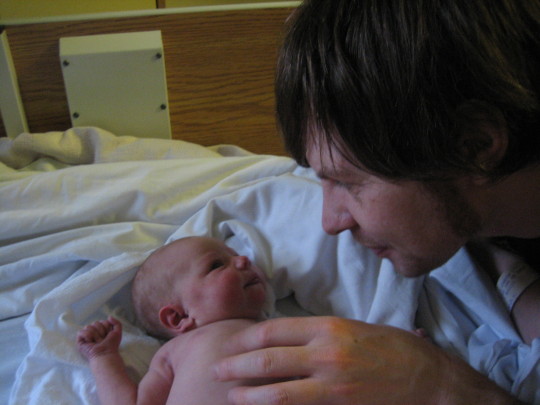
^ two day old Ruby and Dad!
Attachment & Stranger anxiety
Starting as an infant I was very attached to my Mum, being a stay-at-home parent while my Dad was working at CITR. When I was six weeks old I got really sick, it turned out to be a very nasty flu but before they figured it out my Mum and I had to be isolated while every medical test possible was administered to me. I can’t imagine how scary this was to my new young parents but I do know it started a very intense attachment for both me and my Mum. I did, however, have absolutely no stranger anxiety, I would interact with anyone and was never scared when strangers would hold me or talk to me. My Mum says that once I could talk (which was much earlier than other kids, about a year I could say very basic caveman speech) I would speak to every person I would see in grocery stores, parks, or wherever we went.
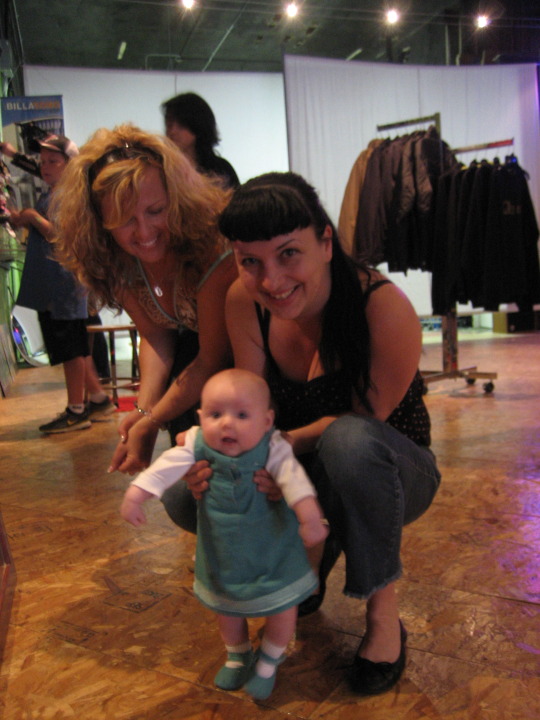
^ three months old being sociable and showing off my stepping reflex
Erik Erikson #1 Trust vs. Mistrust
This one is a no-brainer; I was so cared for and loved I trusted people and was never scared of the world as a child.
Imprinting & Contact Comfort
I absolutely imprinted onto my parents, and also on a select few of my parents’ friends whom I would consider family to this day, I have been surrounded by people, whether they are blood-related to me or not the people I would still consider my family to this day.
My parents have always been super cuddly, I was never not being held growing up and I am so grateful for it because it has definitely made my love language physical touch. I was a baby with a secure attachment to my parents, so much so my parents could never leave me because I would scream and cry instantly without them, even when I was just going to sleep, I would not sleep if they weren't with me.
Jean Piaget’s Cognitive Sensorimotor Stage
Touching, feeling, sucking, I was a curious child who wanted to learn everything. Object permanence is still a problem for me now but I do remember playing peek-a-boo a lot when I was young.
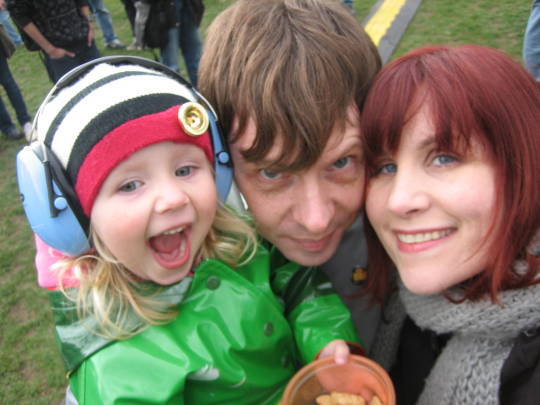
^ age three!
Kohlberg Morality - Preconventional
"Clean your toys or no dessert", "Eat your vegetables or no TV". When I was very small my mum's word was law. I was a very good child who always listened and I never wanted punishment, I didn't like upsetting my parents which is definitely something they instilled in me. When my morality developed I quickly learned that if I did good things than my parents would praise me or my teachers would like me more and give me an extra cookie at preschool or let me be the first in line to recess.
Erik Erikson #2 Autonomy vs. Shame and Doubt
I was properly potty trained with bribery, the movie Happy Feet was the bargaining chip in question. This made me confident and outspoken as a child, I knew what I liked and disliked and could express myself easily
Motor Development
After asking my Mum all about my infancy I have come to the conclusion that I was a pretty average baby, which I can only imagine was a huge relief to my parents. I hit all of my six motor milestones I could sit all by myself at four months and stand with help at six months. Now one thing I never did was crawl. Around five months old, I would scoot around, with one leg in front of me and one behind I would essentially use my baby arm’s brute strength to propel myself in whatever direction and it was so fast and efficient that I just never wanted to crawl. Arms reaching and hands being held I could walk with the help of someone by eight months and I could push myself to stand by a year but I was a very late bloomer when it came to walking. My hips took a bit longer to develop than others and were too loose to hold my body weight so I was a very late walker at eighteen months.
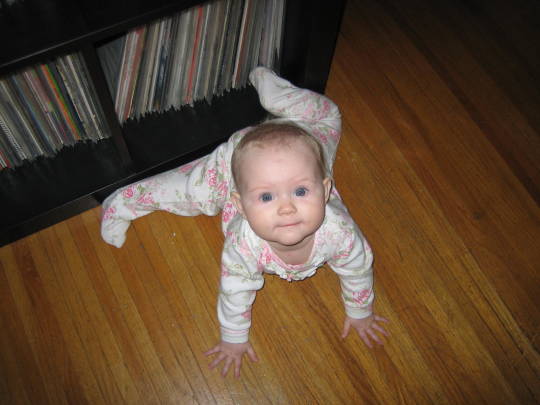
^ This is the scooting position, do NOT ask me to recreate this I don't even know how I did it
Erik Erikson #3 Initiative vs. Guilt
I was a very active and social child, I actually kicked a boy in the nuts at preschool when he told me I couldn't join his club because it was "no girls allowed" and I thought that was unfair, which seems pretty assertive.
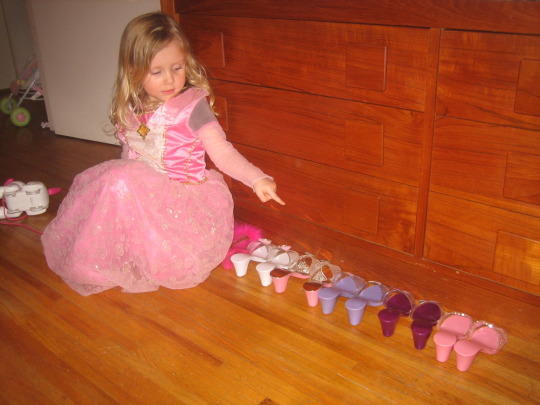
^ The dress I wore when it happened
Years Six to Ten
Parenting styles
I think my parents tried hard when I was young to have a very authoritative parenting style with me, my parents would always tell me that all I had to do was “be the best ruby I could be” which established a very intrinsic motivation in me from a young age, I tried to do the best I could at everything I did and even if I wasn’t the fastest reader or the best speller I was still often proud of myself because I did the best I could do. Things did change however when I was diagnosed with epilepsy my parents definitely took a dip into the authoritarian side, it’s understandable why but they became much more strict and helicopter-y which became a much bigger issue when I entered teenagerhood and was desperate for some room to breathe.
Jean Piaget's Preoperational stage
I actually remember being so frustrated with my friends when I had little spats with them, why couldn't they see what I saw? And understand what I was thinking and saying? Which I know now is egocentrism. I also remember always choosing the taller glasses as a child because I thought there was more. My stuffed animals came everywhere with me, I would speak to them and throw tea parties because (now I know it as animism) in my mind their feelings and thoughts were just like mine.
I wish I could say I remember the Concrete Operational Stage but the ages seven to twelve are honestly a massive blur of emotions and hospital visits and I have kinda blacked out that time.
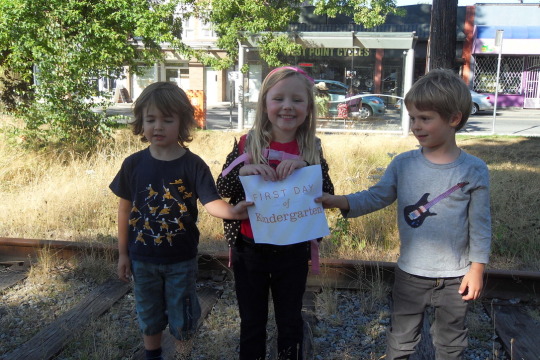
^ first day of kindergarten!
Erik Erikson #4 Industry vs. Inferiority
In elementary school I was pretty badly teased, kids are mean and they did what they did but that ridicule did make me doubt all of the activities I enjoyed doing. I liked dancing but I wasn't the best so I quit, I liked painting but I was nowhere as good as one of my friends so I just stopped doing what I enjoyed.
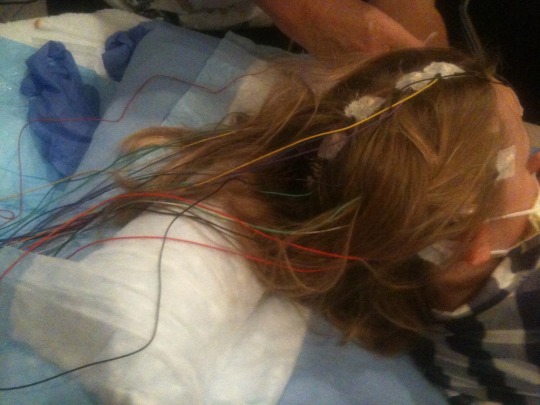
^ All the wires they used for my EEG at the hospital when I was diagnosed
Years Ten to Fifteen
Jean Piagets Formal Operational stage
Finally, I would like to think my cognitive development is quite advanced. One thing I do really remember from that time is having a very vivid imagination. I could zone out and create long detailed stories in my mind about anything, they definitely also worked as a coping mechanism for myself.
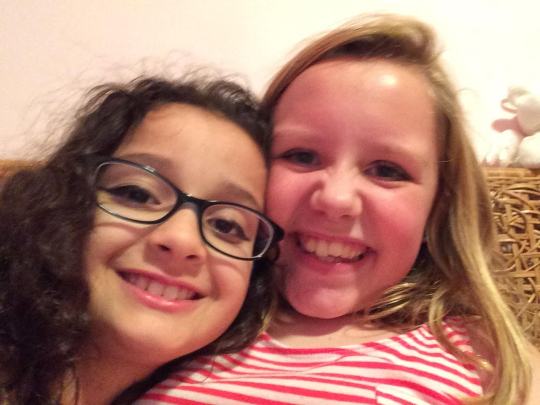
^ ten-year-old ruby
Kohlberg Morality - Conventional
This stage is a weird one, when I was in my early preteen years I wanted so desperately for people to like and approve of me so I really tried to follow social norms to be considered nice, and that worked for a while until I got bullied and I got angry. It was too hard to justify maintaining a social order when bad things were happening to me and others. This was the beginning of my intense obsession with social justice.
Years Fifteen to Twenty
Five stages of grief
I have lost someone in my life, my grandma or Dida (grandma in Bengali) as I called her. She wasn't biologically related to me but it was the sweetest, most caring, strongest person I have ever met in my life and unfortunately, she developed Alzheimer's and decided to get a medically assisted death. Coping with this, being the first person to die in my life was weird. I never really felt the denial, my first stage was anger, I was, one of the last people in my family to hear about it and I was furious, finding out about a month before gave me absolutely no time to prepare while others in my family had up to a year. And yes they had their reasons but it really made me feel like a child, that my parents couldn't trust me with this information. Leading up to her death I kept bargaining with myself, the longer I prolonged seeing her the more I could pretend she wasn’t going to die. After the depression, I just didn’t feel good for a long time. I have struggled with long depressive episodes before and this definitely set me off it wasn't until around the summer I actually started to feel the acceptance that she was gone.
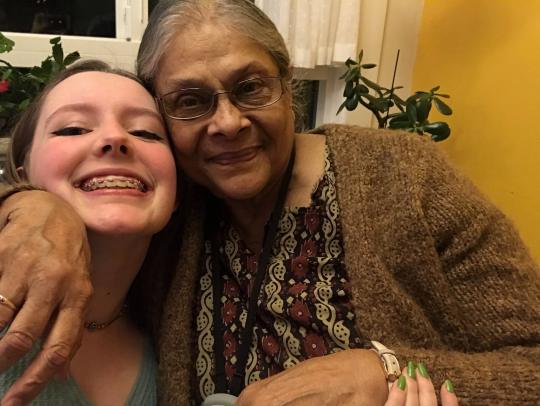
^ Dida and I circa.
Erik Erikson #5 Identity vs. Confusion
I am currently in this stage of my life, and I would like to think I now have a strong sense of identity, my earlier teenage years were filled with many insecurities surrounding myself and how I perceived the world around me but it got better and I feel much more at peace with myself now.

^ Ruby twelve, figuring it out
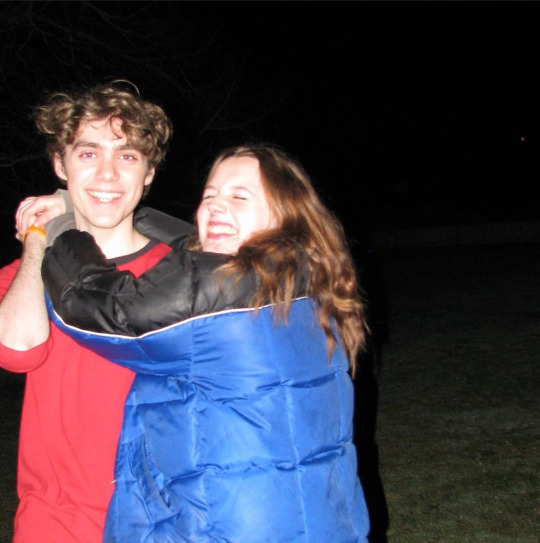
^ Me now, a hell of a lot more confident
Bucket list #1 - Move to Montreal
I want to go there so badly, something about the city life and the queer community is so enticing. I think I'll move out permanently by the time I'm twenty.
Years Thirty to Fifty
Kohlberg Morality - Postconventional
I think now I have a very abstract view of morality. I have my morals and I know that others have different ones but I am quite biased to my own. I think that everyone should have equal basic rights and the fact that society doesn't all agree is the bane of my existence. I also believe that even if some actions aren't the most stereotypically ethical they are still moral. Like looking the other way when someone in need is stealing from a grocery store because food is too expensive and people need to eat.
Erik Erikson #6 Intimacy vs. Isolation
I am praying that my sense of self is strong enough that I'll be able to form strong committed relationships. I know many people say this but I truly think I will continue my friendships after high school, I feel so connected with my friends I truly can't imagine living without them.
Middle ages
I, obviously, can’t predict the future but from my mum's experience entering my middle ages I will most likely have some problems with my hormones again, my Mum experienced significant weight gain and and also a pretty early start to menopause (which I wouldn’t mind at all). I never wanted children growing up, I love kids I think they’re fun but pregnancy really freaks me out. The way it can permanently alter things like what I like to eat, or how I smell things, and also all the health effects and mood changes is just not something I really wish to put my body through. I would like to start a family when I’m around thirty-five but if it's going to be my biological children, helping foster kids or just adopting eight cats is still up for debate. I also want to have a career, I proper job that I can work for and build up in my thirties.
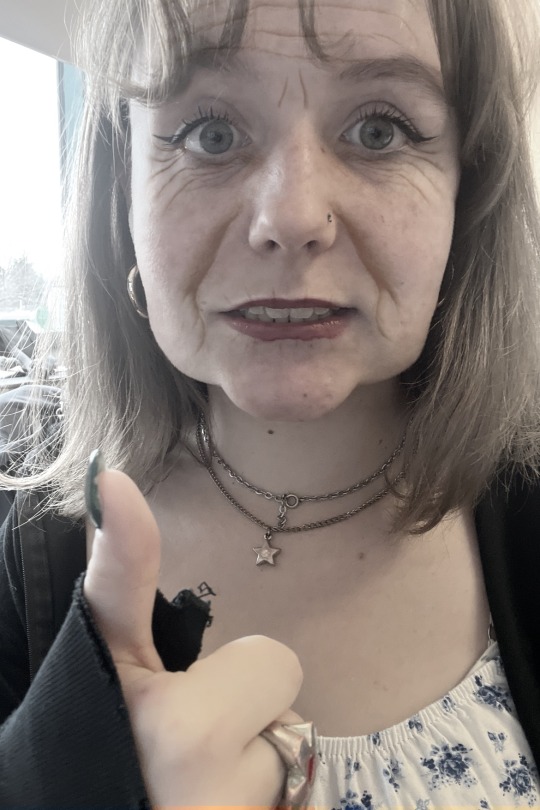
^ jumpscare! This is what an app says I will look like when I'm old
Years Fifty to The End
Erik Erikson #7 Generativity vs. Stagnation
I want to do something that will help people, whether it's being a therapist, school counselor, or social worker I want to do something for change and hopefully, that will make me feel like I have contributed something. Bucket list #2 (Go to a fashion week) would also make me feel like I've been to one cultural event somewhere.
Empty Nest Syndrome
How will I cope? Get a couple cats, start a book club, get more cats.
Old age - health & senility
I am absolutely going to go deaf, or at least have a hearing impairment into my old age. I love music and concerts and the best way to really feel it in my bones and soul is to listen to it as loudly as possible I do wear earplugs when I go to punk shows but I also know I am not the most proactive about it. When I'm older I plan to be however right now, consequences are dammed.
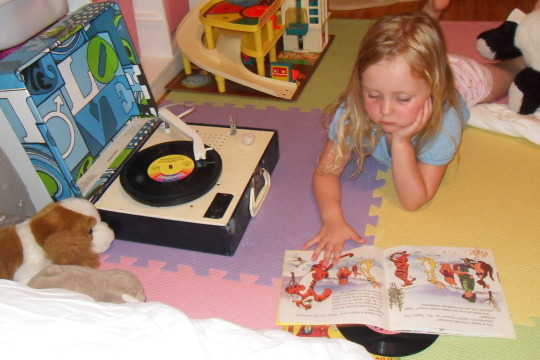
^ The obsession started young
To prevent one of my worst nightmares (Alzhiemers) one of the things I will do for the rest of my life is play word games, the New York Times has free crosswords, sudoku, and other word games that I love to play, and also keep my brain active, especially if I retire in my eighties (in this economy??) so I will continue that until I can no longer, I also read a lot, and I think that will continue to keep my brain stimulated and not go senile. Maybe bucket list #4 - learning an ancient language will help.
Erik Erikson #8 Integrity vs. Despair
I am very scared of death. So who knows how I will feel but I do know whatever I do I will be proud of myself and the life I have created for myself because I am too stubborn and determined to not have the life I want.
The End
I am absolutely terrified of death, every night I remember that there is a possibility I won’t wake up and all of my thoughts, everything I have ever felt will just disappear forever how fun is that thought? My biological grandma died from an aneurysm when she was in her fifties so there is a high chance of that happening. On my father’s side, his Mum died of ovarian cancer so that is also something for me to watch out for! I would like to live for as long as I possibly can, I will have to go with cancer as my way out, it makes the most sense, it quite possibly might be from all the chemicals and radiation all my technology emits but talking about it makes me sound like a boomer.
Hopefully, I will have completed bucket list item #3 (Read as many books as I possibly can) and have made some impact in this world
2 notes
·
View notes
Text
Introspect: Self-Analysis of Developmental Progress
Blog Post #8
Preliminary Drafting: May 6, 2023
Blog Draft Created: June 3, 2023
Blog Posted: June 4, 2023
Post-Publish Revisions:
Not Applicable
I claim that I have developed myself as compared to before. But just how much did I develop? Let us see here!

I think that I have developed ever since I took Psych 101, and I also think that my self-analysis based on some psychological developmental theories may be of help to affirm this claim. I am by no means an expert regarding these theories and as such, some statements may be inaccurate in the perspective of some people. However, I will try my best to be as objective in evaluating myself with the help of the theories I selected, namely: Kohlberg's Theory of Moral Development and Erikson's Theory of Psychosocial Development. I will also make use of one mainstream personality theory, particularly, the Big Five Personality Traits. Lastly, I will also be explaining my overall health using concepts related to the mind-gut connection.
A. Pre-Analysis Thoughts
I honestly believe I have improved quite a lot compared to how I started the Psych 101 course. However, there were times when I regressed due to stress and pressure, although I think I have managed stress and pressure quite well now, especially considering my body does not show signs that I am stressed or pressured. In any case, I am pretty confident that I am more or less psychologically healthy. In terms of the concepts that I will be using below, I think that:
My moral orientation fluctuates between Stages 4 to 6.
I am currently in the Intimacy vs. Isolation stage and prefer intimacy.
I became less neurotic and less extroverted.
My mind and my gastrointestinal tract are both functioning well.
While many of these would probably be correct since I also observed that I am becoming more aware of myself and my environment, partly because of taking Self-Defense classes and mostly because of taking the Psych 101 course, some predictions may still be inaccurate due to bias. Additionally, besides the mind-gut connection that has a multitude of scientific bases, the other approaches are still theoretical and thus may not totally be applicable to my case. Considering all of these, there may be differences in the results and my predictions, hence why I also included the last part to address possible test-induced inaccuracies or my personal biases.
B. Before Taking the Course
To be completely honest, I did not have any expectations of what will be discussed within the entire course because I know that different instructors will approach the course differently. As such, I did not have any relevant test results that I have taken immediately prior to the start of the semester. However, analyzing my actions from before may be able to give insights into how I was before.
Even when I was still studying at my Senior High School campus, I already did not like conforming to norms, although this does not mean I break the school conduct. Instead, I do not like to follow what society considers normal—I do not follow fashion trends, I do not use trending apps, I do not play popular games, and many others. It should therefore not be a surprise when I say that I do not entertain beggars, I retaliate when Christians use their religion to justify wrong deeds, and I oftentimes intentionally leave people on seen.

Retrieved from https://www.psychologynoteshq.com/kohlbergstheory/
Therefore, I can say that my moral compass during this time is oriented toward Stages 4, 5, or 6 on Kohlberg's Stages of Moral Development (or Theory of Moral Development). Mostly though, since I always consider the benefit of involved parties during this time but not the law, I think I used the Stage 5 orientation the most. Stage 5 of Kohlberg's theory is when a person acts for the benefit of him and other involved parties, hence the reciprocity.
Comparing myself to others, I am a very romantic person when it comes to relationships, hence why I generally tend to be careful with the feelings of my loved ones. I also try to spend as much time as I can with people, going so far as to stay awake until past 1:00 AM if the person I am talking to is dear to me. Additionally, when given enough time to prepare, I make sure that I can give little gifts to my friends when I am going on a trip. I do not really like being isolated from my loved ones, hence my clinginess to people I care for even when sometimes, this clinginess does not show up since I repress them when I think I may be going overboard. To tell you frankly, I used to have adult separation anxiety until as recently as last year. As such, my being clingy to other people, especially my friends and family is not out of the blue. In this case, I am choosing between intimacy and isolation and evidently, I prefer intimacy, even just with those whom I consider friends. For reference, this is the conflict of Stage 6 of Erikson's Theory of Psychosocial Development, the summary of which can be viewed below.

Photo by V. Sus (2023). Retrieved from https://helpfulprofessor.com/psychosocial-development-theory-erikson-stages/
These two previous theories are age-related and since I am in the respective stages appropriate to my age, prior to taking Psych 101, both my moral development and psychosocial development are not delayed.
The Big Five Personality is a holistic assessment of an individual's personality, although it tends to only be descriptive rather than explanatory according to some researchers (Lim, 2023). However, it remains the personality theory that is the most widely accepted by psychologists of the present day. In this theory, it is said that a human's behaviors can be modeled through five traits: Openness, Conscientiousness, Extraversion, Agreeableness, and Neuroticism, hence the acronym that is often used for the theory, OCEAN. I personally have taken this personality test although unfortunately, I was not able to take it immediately prior to the start of the course. However, I remember taking it last year and scoring quite high on both neuroticism and extraversion. Looking back, I agree with these results as before, I tend to get mad or upset quite easily and even outwardly express these emotions. Moreover, I was also very outgoing back then and connected a lot with the people I love and care about. In retrospect, this could have also been caused by my adult separation anxiety.
As discussed during one of my Psych 101 class meetings, there is a very strong link between mental health and gut health, which is coined as the Mind-Gut Connection. Since December 2021, I have suffered from chronic gastric inflammation called gastritis. Aside from this, if you can correlate it to my Blog Post #6, this is the same year I experienced the trauma related to my so-called "ex-M.U." Turns out, this bout of chronic gastritis could have been attributed to the aftermath of my initial heartbreak. This, in combination with the stresses brought about by the nearing application period for many universities like De La Salle University-Manila, University of Santo Tomas, Far Eastern University, the entire UP System, and many other universities, is what I claim to be the trigger of my chronic gastritis. When I consulted a gastroenterologist, he told me that he cannot pinpoint the cause of my gastritis through my lifestyle and eating habits and so, one of the most probable causes is stress. It can therefore be triangulated that stress is the real cause of my gastritis, hence anecdotally proving the mind-gut connection.
C. After Taking the Course and Comparative Analysis
After taking the course, I honestly learned so many things and while I know myself that I will not remember all the specifics taught to me, I do know that I will remember the concepts, especially those that can be applied to my life. Talking about these concepts, I will be writing below what I think I became in terms of my morality, social development, neuroticism, extraversion, mental health, and gastrointestinal health.
Moral Development
To supplement the definition of Stage 5 from before, the sixth stage of the Moral Development Theory means a person acts based not on acceptance or mutual benefit but based on what they think is right, uninfluenced by the sake of others. As such, this kind of action is fueled by an internal moral compass, adjusted to do things that do not benefit other people even just to some extent. Using this theory, I can definitely see myself fluctuating between Stages 5 and 6, although compared to before where I always use Stage 5, I now mostly use Stage 6 as demonstrated by my prioritization when taking action. Before, I always do group work first because it will benefit not just me but my groupmates too. However, now, I make sure I prioritize my individual work because the amount of work that needs to be done in this individual work tends to be much greater than in group work, thus needing more attention and focus. In addition, when choosing between responding to my friends and doing my academic outputs, I always choose my academic outputs now because while responding quickly to my friends would, to some extent, increase our closeness because they would think I prioritize them, I think academic matters are more important and are therefore my priority for the time being. And yes, I still retaliate when Christians use their religion to justify their wrong deeds and even their superiority complex. Although, instead of attempting to defend a person being attacked, I am retaliating because I think they need to be taught the hard way that anything immoral remains immoral even when any widely accepted book justifies it. In any case, I do not care whether other people agree or not with me, as long as I am doing what I think needs to be done—to prevent the justification of what I think is wrong.
Psychosocial Development
After multiple times of introspection, what I came up with is that I am still in the sixth stage of Psychosocial Development—Intimacy vs. Isolation stage, and I still choose intimacy over isolation even though I am not currently looking for a prospective lifelong partner nor am I looking forward to meeting one in the future. It must be important to note that this stage does not call for wanting a partner for one to desire intimacy over isolation. This intimacy may come from different sources like family, friends, pets, and many other similar beings. As such, my wanting intimacy with friends is enough to justify my desire for intimacy over isolation. As for my separation anxiety, it has thankfully gone away by now, although some of its manifestations like worrying about the well-being of my loved ones from time to time are still present since it has become second nature to me after suffering for so long from adult separation anxiety. Despite this, I still manage to contain my worry and I do not become controlling or overbearing when I am worried about the safety or happiness of my loved ones. Since I still desire intimacy and am also intimate with select friends, it can therefore be concluded that this separation anxiety only increased my wanting intimacy and not directly caused it.
Big Five Personality Traits
I had personally taken the test for this personality typing and if my memory serves me right, my previous test scores for both neuroticism and extraversion are higher compared to the values I received now. Screenshots of my most recent test scores that pertain to neuroticism and extraversion can be seen below.


My neuroticism decreased by a little bit while my extraversion decreased by a lot. Compared to what I can recall wherein I got 80+ for both neuroticism and extraversion, the values seen above are lower, especially the extraversion one. I think the cause of my becoming extraverted is that I am now able to know how important it is to make time for myself and what I actually need to do that benefits me, not that of other people. I used to be quite people-oriented, and I still am, the difference now is that I do not only see how important it is to connect to other people but I also see how important it is to connect to my inner self rather than ignoring it. The slight decrease in neuroticism though is much harder to explain, although I may have a lead as to why it did not decrease significantly. I am quite neurotic ever since I was a child even when I did not experience neglect, I am confident in my skills, and I do not overreact to many things. I think the reason why I still got such a high neuroticism value is because of the high-stress environment around me that causes me to constantly and deeply feel negative emotions. Although, compared to before, the level of stress I experience now is a lot more manageable despite being subjected to arguably a more stressful environment than in senior high school.
Mind-Gut Connection
I personally think my mental health is much more stable now compared to last year's—I do not always feel sad, I am not always stressed, I feel happy when doing daily things, I am interested in learning more than what was taught, and many more. Compared to before when I used to only learn for the sake of complying with the requirements, I only submitted on time for the sake of not being reprimanded, and I only kept my grades good for the sake of not being shouted at, my being curious now is a significant improvement. And my gut health also supports this, as evidenced by my overall healthier gastrointestinal tract. I now do not experience gastritis often, if at all, and I can also eat without feeling nauseous after only eating a small portion. With a small concern being erased, my mind gets put to rest, hence my better mental health. It can therefore be said that the mind-gut connection is not just a symbiotic connection but it also benefits from feedback loops wherein the improvement of one facilitates the improvement of the other which, in turn, facilitates the further improvement of the one.
D. Post-Analysis Thoughts
Summarizing the entire evidence of my improvements, the following key ideas can be seen:
My moral orientation is now oriented toward self or mutual gain, rather than being somehow bound to conventional morality.
I still prefer intimacy over isolation. I do not have problems being intimate with friends as long as the context is right. I am not seeking to have a romantic partner at the moment.
My moral and psychosocial development milestones are appropriate for my age.
Both my neuroticism and extraversion went down. I am still stressed although I can manage the feeling better now.
My mental health and gastrointestinal (gut) health are steadily becoming better. I now do not experience gastritis often.
Perhaps almost next to nothing can be added here since there does not seem to be any disparity when comparing the comparative analysis results and my previous predictions. If anything, it revealed that I am now quite self-aware as even without a lot of intentional and focused reflection sessions, I already know my current self and how it compares to my previous self.

Wooo! That was a lot. If you are still reading till this point, I congratulate you for your unwavering dedication. I appreciate you reading this blog till the end. See you again!
References:
Lim, A.G.Y. (2023). Big Five Personality Traits: The 5-Factor Model Of Personality. Simply Psychology. https://www.simplypsychology.org/big-five-personality.html
Psychology Notes HQ. (2020). Kohlberg’s Theory [Online image]. The Psychology Notes HQ. https://www.psychologynoteshq.com/kohlbergstheory/
Sus, V. (2023). Erikson's Psychological Stages [Online image]. Helpful Professor. https://helpfulprofessor.com/psychosocial-development-theory-erikson-stages/
Word Count: ~2570 (w/o References), ~2605 (w/ References)
#psychology#introspect#psychosocial development#moral development#erik erikson#lawrence kohlberg#mind gut connection#big five#gastritis
5 notes
·
View notes
Text
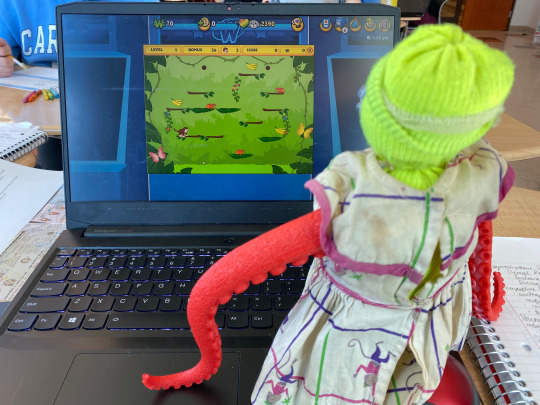
8-12
Describe your sock baby’s growing social connections to friends and family members. How does your baby interact with other sock babies or adults? Are they growing friendships and relationships with others well?
He's friends with Pineapple, and on okay terms with uncle Rose. He enjoys getting to see his great Granddad and great Granddonna (even if he's annoyed by Granddad jokes). He knows he is supposed to be a bit wary of his Granny Virginia and great uncle (Grunkle?) John, but they're fun. Unfortunately, the reason he finds them fun is that they are very permissive. He's also expressed sadness and disappointment that he never got to meet his grandfather.
Which stage of moral development is your child? How do you know? Is your sock baby exhibiting behaviors or thinking that reflect Kohlberg and/or Gilligan’s moral development theories?
He's in the early conventional morality stage. He's begun to care about gaining social approval, but luckily, has fallen in with a good crowd.
Reflect on the gender roles your child might be learning from growing up in your home environment or by other social interactions they experience.
He has now been exposed to cisnormativity and heteronormativity at school long enough to not be just bewildered by it, and is now familiar with typical gender roles. However, as he has good influences at home, he disagrees.
What aspects of your schedule did you change or have to exclude your baby from the most? Who were some people you trusted most with your child if you could not be around? Why?
Chorus concerts, Cocaine Bear viewing. I did not leave him alone unless absolutely necessary, but I trusted my paternal grandparents (he has not been allowed yet to meet maternal grandparents, because they are on another level of permissive, with Gid being so negligent that he literally was not there for my mother's childhood). I did not trust Mama or Uncle John, who are also bad influences. I would trust other sock baby parents who demonstrate good, authoritative parenting, like Boris, if I had to go to the bathroom without Gary. Unfortunately, I sometimes had to trust people I didn't really know well, just because my options were so limited and they were a better option than my Mama. I left him in the lights/sound booth at my last Chorus concert with one of the Theatre teachers and some other guy who is somehow involved in the Theatre, and I left him with someone named Lime who I assumed was one of Sora's friends once for a few minutes so I could go get lunch, because they seemed excited about the concept of babysitting him. They also had tooth earrings and a tooth necklace, which made me believe that they are qualified for alien care. I also left him with my lunch group once, with Addison and Owen in charge, just because they seem like the least likely to teach him arson or something for no reason.
1 note
·
View note
Note
So, the Heinz dilemma is the most famous of a series of moral dilemmas used to test moral reasoning. The full thing is that Heinz's wife is dying, and a local doctor/pharmacutical guy has just found the cure - horray! However, while it only costs £100 to make, he's charging £1,00 for it. Heinz goes to everyone he knows to ask for money, but he only manages to get £500. He offers to pay the doctor the £500 now for the cure, and then pay off the other half later. The doctor refuses. Therefore, in order to save his wife, Heinz steals the cure from him. Was he right to do so?
(the answer is yes)
Anyway, Kohlberg is a psychologist who developed several stages of moral reasoning based on asking these moral dilemmas to children of different ages. He said that generally, as we age, our sense of moral reasoning becomes better. There are 6 stages, divided into 3 sections. IIRC, the first stage is mostly concerned with personal gratification, the second is based on law/punishment, and the third is understanding that morality transcends laws (e.g. in the above example, breaking the law by stealing is the most moral thing to do, or if a law is morally wrong e.g. segregation laws).
There are several issues with Kohlberg's theory, but the main one is that he developed it by only testing on boys. This means that when you test women/girls against it, they tend to come off as morally inferior. This is a big trend in psychology, and tbh science and experiementing generally. If I think to hard about it, I will scream from anger, so we're moving on.
One of the applications of this theory is that it has been used to explain crime and criminal behaviour, by suggesting that criminals have a lower level of moral reasoning. This is somewhat ironic, since the highest level of moral reasoning suggests you should break the law (when justified). Also, it ignores a whole bunch of other shit, like the fact that the biggest predictor of crime is actually someone's postcode but a lot of crime is down to structural issues rather than if someone is "inherently" evil. This is also why biological explanations of crime kinda suck and aren't helpful, but that's a seperate rant
this is so cool thank u icy
1 note
·
View note